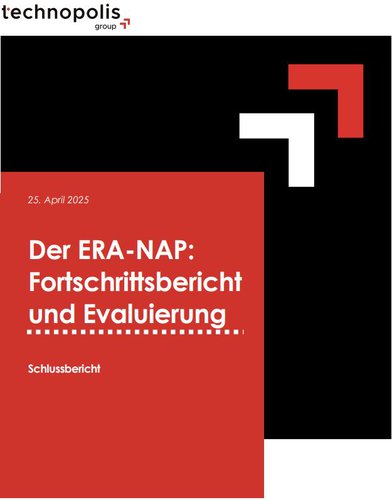08 May 2025
Evaluation report of Austrian National ERA Action Plan published

The final report of the evaluation of the Austrian National ERA Action Plan (ERA-NAP) 2022-2025 on the implementation of the ERA Policy Agenda 2022-2024 in Austria was published by the Federal Ministry of Women, Science and Research on 8 May 2025. The report analyses the implementation of the measures included in the Action Plan as well as the effectiveness of the national governance for the realisation of the European Research Area.
The ERA-NAP serves as Austria’s central governance tool for implementing the ERA Policy Agenda at national level. It outlines Austria’s commitment to 15 of the 20 actions of the first ERA Policy Agenda (2022–2024) through 12 tailored national initiatives. Each initiative outlines coordination responsibilities, strategic objectives, relevant stakeholders, as well as milestones and indicators to measure progress. The initiatives cover a wide range of topics — from structural ones like Open Science, human resources, research infrastructures, or international cooperation, to more thematic topics such as green hydrogen and the Strategic Energy Technology (SET) Plan.
The study concludes that the ERA-NAP has made important strategic and operational contributions to strengthening Austria’s research, technology, and innovation system. Achievements include studies and policy recommendations (e.g. in the area of Open Science), enhanced cooperation between stakeholders (e.g., for improving research careers), or the integration of EU impulses into national strategies (e.g., knowledge valorisation). The ERA-NAP has also improved transparency and raised awareness of ERA processes across Austrian institutions, including among actors previously unfamiliar with ERA-related topics. Moreover, the governance of the ERA-NAP has proved to be efficient. Notably, the support and active involvement of top-level officials at the responsible ministries have strengthened the plan’s legitimacy and increased its success.
Despite these successes, the evaluation highlights some areas for improvement. Initiatives vary as to their level of clarity, ambition, and consistency — some initiatives lack measurable goals or rely on vague indicators. Additionally, the project-based nature of the initiatives raises concerns about their sustainability after the expiry of the ERA-NAP period. While some initiatives have already been integrated into ongoing institutional processes, others lack clear plans for follow-up activities. As such, the study recommends to improve the conceptual consistency and clarity in the next ERA Action Plan, with better-defined responsibilities, milestones, and indicators. Moreover, a central internal monitoring process should be introduced to track milestone-level progress and adapt to changes during the implementation period.
The full report is only available in German. It can be downloaded here:
ERA Portal Austria – Der ERA-NAP: Fortschrittsbericht und Evaluierung